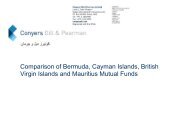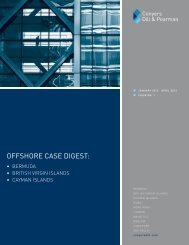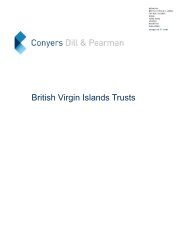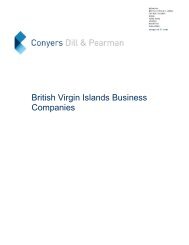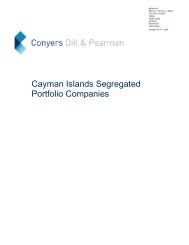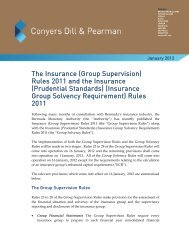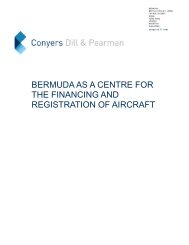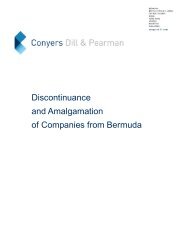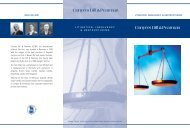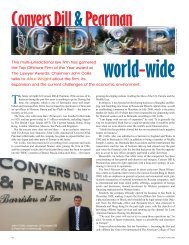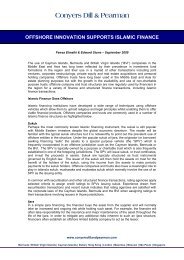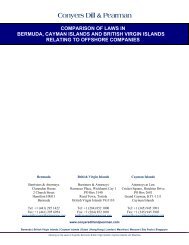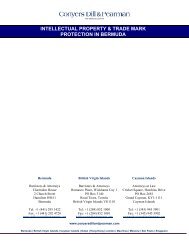Bermuda Trusts - Conyers Dill & Pearman
Bermuda Trusts - Conyers Dill & Pearman
Bermuda Trusts - Conyers Dill & Pearman
You also want an ePaper? Increase the reach of your titles
YUMPU automatically turns print PDFs into web optimized ePapers that Google loves.
<strong>Bermuda</strong> <strong>Trusts</strong>
Foreword<br />
This memorandum has been prepared for the assistance of those who are considering<br />
the formation of trusts in <strong>Bermuda</strong>. It is not intended to be exhaustive nor a<br />
substitute for proper legal advice but provides a basic guide to the trust concept and<br />
an outline of trust law and trust administration in <strong>Bermuda</strong> for clients of <strong>Conyers</strong> <strong>Dill</strong><br />
& <strong>Pearman</strong>.<br />
Clients are advised that they should consider the implications in their home<br />
jurisdiction of establishing a <strong>Bermuda</strong> trust and should consult with their own legal,<br />
financial and other professional advisers as appropriate.<br />
We also recommend that our clients seek legal advice in <strong>Bermuda</strong> on their specific<br />
proposals before taking steps to implement them.<br />
This memorandum has been prepared on the basis of the law and practice as at the<br />
date set out below.<br />
<strong>Conyers</strong> <strong>Dill</strong> & <strong>Pearman</strong><br />
February 2013<br />
Page 2 of 25
TABLE OF CONTENTS<br />
1 Introduction – Planning Uses for <strong>Bermuda</strong> <strong>Trusts</strong><br />
2 The Trust Concept<br />
2.1 Description of trust<br />
2.2 The settlor<br />
2.3 The trustee<br />
2.4 The beneficiaries<br />
2.5 The trust fund<br />
2.6 The protector<br />
3 Typical Forms of Trust<br />
3.1 Discretionary Trust<br />
3.2 Fixed Interest Trust<br />
3.3 Charitable <strong>Trusts</strong><br />
3.4 Purpose <strong>Trusts</strong><br />
4 Trustees’ Duties and Trust Administration<br />
4.1 Trusteesʹ Duties<br />
4.2 Administration of the trust<br />
5 Jurisdiction of the <strong>Bermuda</strong> Courts<br />
6 General Legal Considerations<br />
6.1 <strong>Bermuda</strong> Legislation<br />
6.2 The Hague Convention<br />
6.3 The Rule Against Perpetuities<br />
6.4 Effect of Foreign Laws on <strong>Bermuda</strong> <strong>Trusts</strong><br />
Page 3 of 25
7 Protectors<br />
8 Purpose <strong>Trusts</strong><br />
9 Licensing Requirements of <strong>Bermuda</strong> Trustees<br />
10 Private Trustee Companies<br />
11 Pension <strong>Trusts</strong> and Employee Provident Funds<br />
11.1 Structure<br />
11.2 Legislation<br />
11.3 Registration under the PTFA<br />
11.4 Rule Against Perpetuities<br />
11.5 Stamp Duty<br />
12 Confidentiality<br />
13 Taxation and Stamp Duty<br />
13.1 Private and Purpose <strong>Trusts</strong><br />
13.2 Charitable <strong>Trusts</strong><br />
14 Further Information<br />
Page 4 of 25
STATUTORY REFERENCES<br />
References to legislation are <strong>Bermuda</strong> Acts unless otherwise stated.<br />
Abbreviation<br />
Name of Act<br />
PTFA Pension Trust Funds Act 1966<br />
Trustee Act<br />
Trustee Act 1975 (as amended)<br />
1987 UK Act Recognition of <strong>Trusts</strong> Act 1987 (UK)<br />
Perpetuities Act Perpetuities and Accumulations Act 1989<br />
1989 Act <strong>Trusts</strong> (Special Provisions) Act 1989<br />
Trustee Regulation Act <strong>Trusts</strong> (Regulation of Trust Business) Act 2001<br />
1998 Amending Act <strong>Trusts</strong> (Special Provisions) Amendment Act 1998<br />
1999 Amending Act Trustee Amendment Act 1999<br />
Hague Convention Hague Convention on the Recognition of <strong>Trusts</strong><br />
NPS(OP)A 1998 National Pension Scheme (Occupational Pensions) Act 1998<br />
PCA<br />
Proceeds of Crime Act 1997 (as amended)<br />
2004 Amending Act <strong>Trusts</strong> (Special Provisions) Amendment Act 2004<br />
Page 5 of 25
1. INTRODUCTION - PLANNING USES FOR BERMUDA TRUSTS<br />
<strong>Bermuda</strong> trusts are employed to achieve a variety of estate, personal, financial, tax or<br />
other business planning objectives. These objectives often include one or more of the<br />
following:<br />
<br />
<br />
<br />
<br />
<br />
<br />
<br />
<br />
<br />
<br />
provision for spouses and dependents<br />
protection of assets from future personal liability<br />
minimization of estate/inheritance tax, income tax and capital gains tax<br />
preservation of family wealth and continuity of family businesses<br />
efficient and timely distribution of assets upon death<br />
protection against exchange controls<br />
creating or making provision for charities<br />
establishing pensions or employee stock option plans<br />
ownership of particular assets or of investments generally<br />
lender protection in corporate financing transactions<br />
2. THE TRUST CONCEPT<br />
The trust is a legal concept originally developed by English courts of equity although<br />
it is now governed, to a certain extent, by legislation. <strong>Bermuda</strong> trust law is based on<br />
English trust law but has been enhanced in certain areas by <strong>Bermuda</strong> legislation.<br />
English common law is of highly persuasive authority in <strong>Bermuda</strong>.<br />
2.1 Description of trust<br />
A trust is the legal relationship created whereby a person (the "settlor") gives property<br />
(the "trust fund") to the trustee or trustees to hold the legal title to the trust fund for<br />
the benefit of certain persons (the "beneficiaries") or for a specified purpose. Some<br />
trust arrangements also include a "protector".<br />
Page 6 of 25
The characteristics of a trust are described in s.2 (2) of the 1989 Act as follows:<br />
(a) the trust assets constitute a fund separate from the trusteesʹ own property;<br />
(b) legal title to the trust assets are held in the name of the trustee or in that of a<br />
nominee on behalf of the trustee;<br />
(c) the trustee has the power and also the duty to manage and dispose of the trust<br />
assets in accordance with the terms of the trust for the benefit of the<br />
beneficiaries in accordance with the fiduciary duties imposed upon him by<br />
law.<br />
2.2 The settlor<br />
The settlor may also be a beneficiary and, in certain circumstances, can act as a<br />
cotrustee. The settlor cannot be a sole trustee and a sole beneficiary of his trust. A<br />
company may act as settlor if it has the corporate capacity to make a gift of its assets<br />
or otherwise to dispose of them for the purpose of establishing a trust.<br />
2.3 The trustee<br />
The trustee is the person, or persons, who holds the legal title to the trust fund and<br />
who is obligated to administer the trust for the benefit of the beneficiaries. The<br />
trustee can be a company if it has the corporate capacity to act as a trustee.<br />
The trustee stands in a fiduciary position visavis the beneficiaries and is required to<br />
honour certain stringent duties imposed by law (outlined in paragraph 4).<br />
2.4 The beneficiaries<br />
The beneficiaries can be individuals, companies and other legal entities. <strong>Trusts</strong> can<br />
also be established to further charitable or noncharitable purposes.<br />
In order for a private trust to be valid, the identity of the beneficiaries must be capable<br />
of being established with sufficient certainty. Thus in the case of a trust for groups or<br />
classes of persons, the trustee must be able to determine whether any given person is<br />
or is not a member of that group or class.<br />
Page 7 of 25
2.5 The trust fund<br />
The property constituting the trust fund can be any type of real or personal property<br />
(e.g. cash, securities, real estate, personal effects or other tangible or intangible<br />
property). The property must be capable of being ascertained in order to be subject to<br />
a trust.<br />
2.6 The protector<br />
The protector is usually a person who is a friend or advisor of the settlor. The<br />
inclusion of a protector is not necessary for the creation of a <strong>Bermuda</strong> trust but can<br />
balance the wide discretionary and fiduciary powers often given to the trustee under<br />
the trust. Typically, the protector (which may be an individual or committee of<br />
individuals or a company) is appointed to ensure the wishes of the settlor are carried<br />
out by the trustees. The role of the protector is considered in more detail in paragraph<br />
7 below.<br />
3. TYPICAL FORMS OF TRUST<br />
3.1 Discretionary Trust<br />
The discretionary form of trust often provides the most flexible and efficient structure<br />
for the settlor and the beneficiaries.<br />
After establishing the trust, the settlor will normally have divested himself of any<br />
ownership interest in the assets held in the trust (unless he retains certain powers).<br />
Under the terms of a discretionary trust, the trustee is generally given wide<br />
discretionary powers over the trust fund and decides (according to the beneficiariesʹ<br />
best interests as a whole) when and to which beneficiary he should distribute capital<br />
and or income of the trust, and in what proportions. For this reason, the beneficiaries<br />
are regarded as not having a specific interest in the trust but only a right to be<br />
considered when the trustee exercises his discretions.<br />
3.2 Fixed Interest Trust<br />
Under a fixed interest trust, primary beneficiaries will normally be granted a right to<br />
receive the income and capital of the trust fund and the trustees will have little or any<br />
discretion over the nature and extent of distributions from the trust fund.<br />
Page 8 of 25
The fixed interest form of trust is used for estate planning purposes or to ensure that<br />
certain property passes on stipulated terms and at stipulated times for the benefit of<br />
relevant family members in an orderly manner. It is often specially drafted to suit the<br />
particular planning goals contemplated by the settlor (e.g. the settlor of a fixed<br />
interest trust can provide that the beneficiaries will not be able to sell off or otherwise<br />
dispose of their inheritance in a hasty manner). Many modern pension trusts take the<br />
form of fixed interest trusts where the trustee holds fixed share for the member<br />
(beneficiary) of the pension scheme.<br />
3.3 Charitable <strong>Trusts</strong><br />
A charitable trust may be established under <strong>Bermuda</strong> law to create a charitable fund<br />
or to make provision for existing charitable institutions or purposes.<br />
A trust under <strong>Bermuda</strong> law, which follows English law, is charitable if:<br />
(a) all its purposes fall exclusively within one or more of the categories of<br />
charitable purposes recognized by law listed below:<br />
i. the relief of poverty;<br />
ii. the advancement of education;<br />
iii. the advancement of religion;<br />
iv. other purposes beneficial to the community at large; and<br />
(b) there is an element of public benefit.<br />
If a trust is established for purposes which are not exclusively charitable, it may be<br />
treated as a private noncharitable trust. Accordingly, such a trust will be held invalid<br />
unless the trust is for the benefit of certain persons and limited to a specified<br />
perpetuity period within the rule against perpetuities or unless it is properly<br />
constituted as a purpose trust in accordance with the 1989 Act (see following<br />
paragraph).<br />
Page 9 of 25
A charitable trust may continue indefinitely.<br />
3.4 Purpose <strong>Trusts</strong><br />
The concept of a noncharitable purpose trust was first introduced into <strong>Bermuda</strong> law<br />
under the <strong>Trusts</strong> (Special Provisions) Act 1989. <strong>Bermuda</strong> was the first offshore<br />
jurisdiction to provide for these trusts by statute.<br />
The 1989 Act permits the creation of a trust for the benefit of purposes (whether<br />
charitable or not), as opposed to specific persons. A purpose trust may continue<br />
indefinitely, however, the rule against the remoteness of vesting, as modified by the<br />
Perpetuities Act, will apply to a purpose trust.<br />
The 1998 Amending Act introduced a number of refinements to noncharitable<br />
purpose trusts aimed at enhancing their reputation as effective offshore vehicles in a<br />
variety of applications, particularly commercial transactions. Essentially, the 1998<br />
Amending Act provides that a trust may be established for noncharitable purposes,<br />
provided that such purposes are sufficiently certain for the trust to be carried out,<br />
lawful, and not contrary to public policy. It is no longer required for a trustee to be a<br />
"designated person" (i.e. a local licensed trust company or other local professional not<br />
required) and the 1989 Amending Act now provides expressly who has standing<br />
before the courts.<br />
The uses of purpose trusts are summarized at paragraph 8 below.<br />
4. TRUSTEES DUTIES AND TRUST ADMINISTRATION<br />
4.1 Trustees' Duties<br />
Trustees are required by law to fulfil certain fiduciary duties. The most important<br />
duties include the following:<br />
(a) to act honestly and in good faith for the best interests of the beneficiaries in<br />
accordance with the terms of the trust;<br />
(b) to bring and keep under their control trust property which must be kept<br />
separate from their private property and from any other property of which<br />
they are trustees;<br />
Page 10 of 25
(c) to obey the terms of the trust deed unless all the beneficiaries are adult and<br />
consent to trustee actions contrary to the terms of the trust or if the court<br />
sanctions a variation of the trustʹs terms;<br />
(d) to act impartially between the beneficiaries. This duty amounts to a fair<br />
balancing of the interests of beneficiaries, particularly where certain<br />
beneficiaries are entitled to current income and others to future interests in<br />
capital;<br />
(e) when considering investment of the trust fund, to act as a prudent investor<br />
would and exercise reasonable care, skill and caution when investing or<br />
applying trust property. Pursuant to the 1999 Amending Act, trustees of<br />
<strong>Bermuda</strong> trusts now have the power, subject to a contrary intention expressed<br />
in the terms of the trust, to invest and apply trust property in the purchase or<br />
acquisition of property of any kind, whether or not income producing. This<br />
effectively abolishes the previous duty of trustees to preserve the trust<br />
property and sell any wasting assets and modernises <strong>Bermuda</strong> trust law to<br />
bring trustees in line with current practice;<br />
(f) to exercise reasonable care, skill and caution when choosing a delegate or<br />
supervising a delegate. The basic rule under English common law was that a<br />
trustee could not delegate the exercise of his duties. This is not in line with<br />
modern practice however, particularly with regard to investment<br />
management. The 1999 Amending Act significantly widened trustees’<br />
delegation powers allowing them to delegate all functions of an administrative<br />
or managerial nature to an agent. Trustees must exercise reasonable care, skill<br />
and caution when selecting an agent. Subject to wider authority in the trust<br />
deed there is a list of trustee functions which are not delegable; such as<br />
formulating an investment policy for the trust, or exercising discretion to make<br />
distributions of income or capital for the benefit of a beneficiary;<br />
(g) to exercise reasonable care, skill and caution in the administration of the trust<br />
and the investment of the trust assets. Unpaid trustees are bound only to use<br />
such due diligence and care in the management of the trust as a man of<br />
ordinary prudence, diligence and vigilance would use in the management of<br />
his own affairs. A higher standard of diligence and knowledge is expected<br />
from professional trustees who receive remuneration for their services (unless<br />
the trust deed provides otherwise);<br />
Page 11 of 25
(h) to act unanimously unless otherwise expressly authorized under the trust<br />
deed. Accordingly, investments and all trust property should be in the joint<br />
names or held to the order of all trustees;<br />
(i) to act gratuitously, unless remuneration is authorized by the trust deed. The<br />
1999 Amending Act introduced an exception to this rule so that now licensed<br />
trust companies are entitled to “reasonable remuneration” for their services as<br />
trustee;<br />
(j) not to profit from the trustʹs property nor to purchase trust property for<br />
personal enjoyment. A trustee must account to the beneficiaries for any profit<br />
or other benefit received by virtue of his position as trustee. The purchase by a<br />
trustee of trust property is voidable by a beneficiary, unless authorized by the<br />
trust deed, irrespective of the fairness of the price paid;<br />
(k) to keep accounts and at all reasonable times and on request to furnish any<br />
beneficiary with accounts. Pursuant to the Amendment of <strong>Trusts</strong> (Regulation<br />
of Trust Business) Exemption Order 2002, an exempted company shall retain<br />
information on trusts for which it acts as trustee and trust records of account<br />
must be kept for a period of five years from the date on which such records<br />
were prepared.<br />
4.2 Administration of the trust<br />
Trustees are required, as a matter of law, to keep proper records and accounts of all<br />
trust assets and trust business. As a matter of proper administrative practice, all<br />
substantive trustee decisions or business decisions taken at the trustee level should be<br />
approved and recorded in trustee minutes.<br />
The trustees should hold at least one or two formal trustee meetings each year in<br />
order to review and consider the accounts, trust business and financial position of the<br />
trust as a whole.<br />
Trustees are required by law to ensure that they are properly informed as to the value<br />
of the trust assets and the nature of the business activities of any corporate entities<br />
held by them. Successor trustees are also impressed with a duty to review the history<br />
of the trustʹs business and examine the accounts and other trust records in order to<br />
satisfy themselves that no prior breach of trust has occurred.<br />
Page 12 of 25
Where the trust assets are being reinvested on a regular basis, the trustees will often<br />
recommend that a professional investment advisor be employed to make<br />
recommendations to the trustees so that the trustees have professional advice upon<br />
which to base their investment decisions or to assist the management of the assets.<br />
5. JURISDICTION OF THE BERMUDA COURTS<br />
Under Section 9 of the 1989 Act, the jurisdiction of the Supreme Court of <strong>Bermuda</strong> in<br />
respect of matters concerning a <strong>Bermuda</strong> trust is established in any of the following<br />
circumstances:<br />
(a) where a trustee is resident in <strong>Bermuda</strong>;<br />
(b) where any trust property is situate in <strong>Bermuda</strong> but only in respect of such<br />
property;<br />
(c) where the administration of any trust is carried on in <strong>Bermuda</strong>; or<br />
(d) where the Court thinks it is appropriate.<br />
It is usually advisable to ensure that substantive contacts with <strong>Bermuda</strong> are<br />
established in order to create a clear jurisdictional nexus (i.e. the trust administration<br />
should take place in <strong>Bermuda</strong> or there should be at least one <strong>Bermuda</strong> resident<br />
trustee).<br />
However, it should be noted that there is no requirement that the settlor be resident<br />
in, or have any physical connection with, <strong>Bermuda</strong>. Nor is it necessary, although it<br />
may often be advisable, to have the trust property situate in <strong>Bermuda</strong>.<br />
6. GENERAL LEGAL CONSIDERATIONS<br />
6.1 <strong>Bermuda</strong> Legislation<br />
The principal legislation governing trusts in <strong>Bermuda</strong> is the Trustee Act, (as amended<br />
by the 1999 Amending Act), the 1989 Act (as amended by the 1998 Amending Act and<br />
the 2004 Amending Act), the Perpetuities Act, the Trustee Regulation Act, and the<br />
Conveyancing Amendment Act.<br />
Page 13 of 25
The Trustee Act, amongst other things, grants certain powers to trustees of <strong>Bermuda</strong><br />
trusts including the power to apply income for maintenance and education and to<br />
advance capital to a beneficiary who is entitled to a presumptive share. These powers<br />
will apply unless excluded or restricted or varied by express terms in the relevant<br />
trust deed. The Trustee Act also grants the Court jurisdiction to vary a trust in certain<br />
circumstances.<br />
The 1989 Act (as amended by the 1998 Amendment Act) is comprised of three parts<br />
that deal with three quite separate matters:<br />
(a) The first part (a) clarifies that the governing law of a trust can be a matter of<br />
choice and can be changed to another law, (b) sets out the circumstances in<br />
which the <strong>Bermuda</strong> court has jurisdiction over trusts (see paragraph 5 above),<br />
(c) establishes favorable rules regarding the capacity of a settler to create<br />
<strong>Bermuda</strong> trusts and (d) protects <strong>Bermuda</strong> trusts from attack pursuant to<br />
foreign laws.<br />
(b) The second part contains the statutory basis for the establishment and<br />
operation of noncharitable purpose trusts (see paragraph 4 above).<br />
(c) The third part sets out a standard list of administrative provisions that can be<br />
incorporated by reference into trust documents and greatly shorten their<br />
length.<br />
The Conveyancing Amendment Act introduced conservative provisions to avoid<br />
certain dispositions where the dominant intention is to put assets beyond the reach of<br />
creditors.<br />
6.2 The Hague Convention<br />
By Order in Council, the 1987 UK Act has been made applicable to <strong>Bermuda</strong> as of 1st<br />
June 1989.<br />
The 1987 UK Act incorporates the major provisions of The Hague Convention into the<br />
law of the United Kingdom.<br />
Essentially, the 1987 U.K. Act confirms and clarifies common law conflict of law<br />
principles applicable to trusts (e.g. as to jurisdiction and the applicable proper law of<br />
the trust) and provides a general descriptive definition of the characteristics of a trust<br />
Page 14 of 25
(also confirming the common law position). The 1989 Act also adopts certain of these<br />
provisions of the Convention verbatim.<br />
The importance of the 1987 U.K. Act is the provision of a "codified" set of principles of<br />
trust law which can be referred to for the benefit of civil law or other foreign<br />
jurisdictions where the concept of a trust is not recognized.<br />
At present, Italy, Australia, Canada, the Netherlands, Luxembourg and the U.K. have<br />
ratified the Convention and China, Cyprus, Malta, Liechtenstein, France and U.S.A.<br />
have signed but not ratified.<br />
6.3 The Rule Against Perpetuities<br />
The English common law rules against the vesting of trust property in perpetuity and<br />
against the remoteness of vesting apply in <strong>Bermuda</strong> as amended by the Perpetuities<br />
Act.<br />
The Perpetuities Act modernizes and simplifies the application of the rule against<br />
perpetuities so as to ensure the validity of certain trusts which would otherwise have<br />
been invalid under common law rules.<br />
The Perpetuities Act provides that a fixed period not to exceed 100 years may be<br />
chosen as the duration of a trust. It further introduces the "wait and see" principle so<br />
that a gift in trust will not fail for remoteness of vesting until it is established that the<br />
gift will not vest within the perpetuity period. Under the common law rule, a gift<br />
fails if it might not vest within the perpetuity period.<br />
The application of the "wait and see" rule is not retroactive; it applies to trusts created<br />
after 31st January 1990.<br />
Section 15 of the Perpetuities Act provides that accumulations of income under a trust<br />
may continue for the duration of the perpetuity period (i.e. either 100 years or the<br />
common law perpetuity period of a life in being plus 21 years).<br />
6.4 Effect of Foreign Laws on <strong>Bermuda</strong> <strong>Trusts</strong><br />
Section 11 of the 1989 Act (as amended by the 2004 Amending Act) provides that a<br />
trust which is validly created under the laws of <strong>Bermuda</strong> shall not be varied or set<br />
aside by a <strong>Bermuda</strong> court and no disposition of property to be held upon the trusts<br />
Page 15 of 25
thereof is void, voidable, liable to be set aside for any reason, nor is the trustee, any<br />
beneficiary or any other person to be subjected to any liability or deprived of any<br />
rights, by reason that –<br />
(a) the law of any another jurisdiction prohibits or does not recognise the<br />
concept of a trust;<br />
(b) the trust or disposition avoids or defeats rights, claims or interests<br />
conferred by the law of another jurisdiction upon any person by reason of<br />
a personal relationship to the settlor or to any beneficiary or by way of<br />
heirship rights, or contravenes the law of another jurisdiction or any<br />
foreign judicial or administrative order or action intended to recognise,<br />
protect, enforce or give effect to any such rights, claims or interests; or<br />
(c) the trust or disposition avoids or defeats rights, claims or interests<br />
conferred by the law of another jurisdiction upon any person in respect of<br />
the protection of creditors in matters of insolvency.<br />
The section is intended to clarify the position that <strong>Bermuda</strong> trusts will be held valid, if<br />
contested in a <strong>Bermuda</strong> court, when subject to a challenge based on foreign forced<br />
heirship laws, mandatory community property matrimonial laws and, in certain<br />
cases, when challenged under foreign bankruptcy laws. These rules, originally<br />
introduced in the 1989 Act, have been recently enhanced by the 2004 Amendment Act,<br />
which came into force on 17 December 2004 and will further strengthen the position<br />
of <strong>Bermuda</strong> trustees in resisting any such litigation.<br />
7. PROTECTORS<br />
There is no definition of a "protector" in the statutes or case law in England or<br />
<strong>Bermuda</strong>. However, the practice of designating certain persons to be protectors in<br />
offshore trust deeds is quite common, especially where the settlor is from a country<br />
which does not recognise the concept of a trust (e.g. such as most South American<br />
countries).<br />
The protector is usually a person who is a close friend or other confidant of the settlor.<br />
Typically, the protector (which may be one individual, a committee of individuals or a<br />
company) is appointed to ensure that the wishes of the settlor of the trust are carried<br />
out by the trustees in the proper fashion.<br />
Page 16 of 25
The protector will normally be given an express power to receive financial<br />
information and to review the investment management of the trust. Also, he will be<br />
able to advise the trustees on what financial needs the beneficiaries may have. The<br />
protector often holds certain powers, such as: (i) power to remove and appoint<br />
trustees; (ii) power to agree trustee fees and (iii) power to vote or consent to the<br />
addition or removal of beneficiaries.<br />
Whether the protector is deemed as having fiduciary obligations may well depend<br />
upon the type of powers that he holds under the trust. Dicta in the <strong>Bermuda</strong> case Von<br />
Knieriem v <strong>Bermuda</strong> Trust Co. Ltd. indicated that the power to remove and appoint<br />
trustees is a fiduciary one so that the exercise of the power can potentially be<br />
reviewed by a court of law. However, the caselaw involving protectors has not<br />
determined the question of whether a protector owes fiduciary obligations directly to<br />
the beneficiaries (or the settlor). Most trust deeds attempt to limit the fiduciary nature<br />
of the responsibilities of the protector since he or she is usually not a professional<br />
trustee, but rather a close friend or advisor of the settlor.<br />
A protector is not a trustee and every effort should be used to ensure he does not<br />
appear to be one. If the protector is conferred too many powers under the terms of<br />
the trust deed, he could be considered to be a de facto trustee and subject to all of the<br />
stringent fiduciary duties of trustees. Accordingly, careful drafting of the trust deed<br />
is important to ensure that the protector is independent of the trustee (as a general<br />
rule).<br />
8. PURPOSE TRUSTS<br />
The 1989 Act provides a statutory basis from which to create trusts for noncharitable<br />
purposes in <strong>Bermuda</strong>. This is something that English law, with some anomalous<br />
exceptions, has generally declined to give legal force to.<br />
In 1998, the 1989 Act was amended to provide increased flexibility in the structuring<br />
of purpose trusts as well as clarifying the definition of purpose trusts in <strong>Bermuda</strong>,<br />
with the aim being to provide a more streamlined approach to the administration of<br />
purpose trusts.<br />
A purpose trust will be valid provided that its purposes are:<br />
<br />
sufficiently certain to allow the trust to be carried out,<br />
Page 17 of 25
lawful, and<br />
not contrary to public policy.<br />
Essentially a purpose trust has no specified beneficiaries who would have an<br />
enforceable claim or interest in the trust fund. It should be noted that while the rule<br />
against perpetuities (otherwise known as the rule against excessive duration) does not<br />
apply to purpose trusts created under the legislation, the rule against remoteness of<br />
vesting still applies to purpose trusts created under the legislation.<br />
However, the statutory definition of a <strong>Bermuda</strong> purpose trust allows for a person or<br />
company to receive indirect or intangible benefits, without disqualifying the trust<br />
from the definition of a purpose trust.<br />
Aside from no beneficiaries, the other elements of the trust relationship are present. A<br />
trustee receives property from some person (or may declare a trust) and holds and<br />
distributes that property in accordance with fiduciary obligations. Those obligations<br />
are not to act in the best interests of beneficiaries, but to administer the trust property<br />
in fulfilment of the stated purposes. The stated purposes may be such that they are<br />
carried out through the trustee expending that property until it is exhausted or the<br />
trust terminates, or they may be carried out by the trustee holding onto specific<br />
property and using it or controlling it in a certain way. An example of the first of<br />
these might be spending money to promote a particular political cause or quasiphilanthropic<br />
cause. An example of the second might be to hold shares in a company<br />
that are to be voted so as to perpetuate a particular type of business or to ensure that<br />
the company carries out a particular activity.<br />
Before the 1998 Amending Act a purpose trust had to have an "enforcer". The<br />
"enforcer" could obtain a petition from the court forcing the trustees to fulfil their<br />
obligations. It became clear that, in practice, any enforcement really came from the<br />
courts and that the role of the enforcer was less significant than originally thought.<br />
The 1989 Act therefore, was amended, allowing any of the following people the right<br />
to petition the court:<br />
<br />
a person appointed under the trust for this purpose;<br />
the settlor (unless express provision to the contrary );<br />
Page 18 of 25
a trustee of the trust;<br />
any person the court feels has sufficient interest in the enforcement of the trust.<br />
The AttorneyGeneral may also make an application to the court where there are no<br />
other persons who are willing and able to make an application to the court.<br />
Previously, only those on the list of "designated" persons could be appointed trustee.<br />
Under the 1998 Amending Act any person, whenever resident, may be appointed<br />
trustee, thus reflecting general trust law and allowing greater flexibility.<br />
Purpose trusts continue to be a popular option for the promotion of <strong>Bermuda</strong><br />
companies to participate in transactions (such as asset financing where an "orphan<br />
company" is desirable), or to perform specific activities (such as owning a private<br />
trustee company which acts as the trustees of a particular trust or group of trusts).<br />
9. LICENCING REQUIREMENTS OF BERMUDA TRUSTEES<br />
The Trust (Regulation of Trust Business) Act 2001, which came into effect on 25th<br />
January 2002, was passed as a result of recommendations of the KPMG report on<br />
<strong>Bermuda</strong>. It provides that any person who carries on "trust business" in or from<br />
<strong>Bermuda</strong> must be licensed unless he is covered by one of the exemptions under the<br />
Exemption Order (due to be made shortly). Before, only trust companies were<br />
required to be licensed.<br />
"Trust business" is defined as "the provision of the services of a trustee as a business,<br />
trade, profession or vocation".<br />
There are two types of licence available: unlimited and limited licences. Only trust<br />
companies are permitted to hold unlimited licences whereas individuals or<br />
partnerships are restricted to limited licences only. A limited licence trustee may hold<br />
trust assets in an amount not exceeding an authorised amount. Although originally<br />
set at $30 million, it is proposed to remove this fixed ceiling and give the BMA power<br />
to vary the maximum amount on a case by case basis depending on the nature and<br />
scope of the trust business of the trustee. The underlying policy objective is that all<br />
trust business of significant size and complexity should be conducted inside a trust<br />
company.<br />
Page 19 of 25
A limited licence trustee may hold trust assets in an amount exceeding the authorised<br />
amount provided an unlimited licence is appointed to manage and administer the<br />
excess amount.<br />
An individual trustee is exempted from the licencing requirements where (i) he is a<br />
cotrustee of a trust and at least one of the other cotrustees is an unlimited licenced<br />
trustee; (ii) where he is a member of recognised professional body in <strong>Bermuda</strong>; (iii)<br />
where he is a professional person and appoints a specified licenced trust company to<br />
maintain the trust records; and (iv) where he is a trustee of certain pension funds.<br />
A private trust company is exempted from the licensing requirements although it is<br />
required to state the nature and scope of the business, being that business which is set<br />
out in the Memorandum of Association, in the written notice confirming that the<br />
company qualifies for exemption.<br />
Trust licensees are regulated by the BMA. They are required to provide the BMA<br />
with such information as may be reasonably required for insuring it is complying<br />
with the provisions of the Act, to maintain trust records and separate accounts and<br />
abide by the Code of Conduct.<br />
10. PRIVATE TRUST COMPANIES<br />
A private trust company may be incorporated in <strong>Bermuda</strong> with the limited object of<br />
acting as trustee for a restricted class or group of trusts, and is advantageous for a<br />
number of reasons.<br />
The cost of incorporating and operating a private trustee company may be lower than<br />
the fees of a professional trust corporation. Use of such a company ensures greater<br />
flexibility and confidentiality and allows the settlor and his family or friends, if he so<br />
wishes, to play an active role by serving on the board of directors or by owning the<br />
shares of the Company. The shares of the company may be held in a purpose trust,<br />
charitable trust or other private trust.<br />
The private trust company also has a role to play in reducing the potential liability of<br />
professional trustees. Due to the increasing risk of being sued both by beneficiaries<br />
and third parties, professional trustees are increasingly reluctant to take ownership of<br />
assets or participate in ventures where substantial risks may be present, such as<br />
owning commercial real estate in high tax jurisdictions, venture capital investments or<br />
Page 20 of 25
companies which own ships or aircraft. The professional trusteeʹs preference is<br />
normally for a diversified portfolio of low risk investment. In such circumstances the<br />
incorporation of a private trust company may be advisable. The professional trustee<br />
is then able to provide management and administration services to the trust company<br />
rather than acting as trustee.<br />
11. PENSION TRUSTS AND EMPLOYEE PROVIDENT FUNDS<br />
Employee benefit plans and/or international pension plans are often set up in<br />
<strong>Bermuda</strong> by subsidiaries of multinational corporations.<br />
Usually such plans are established to benefit employees who are nationals of different<br />
countries or who happen to travel from country to country for employment periods of<br />
several years in each country. The common advantages to utilizing such plans are: (a)<br />
less regulation of such plans in <strong>Bermuda</strong> (whereas there may be complicated<br />
regulations in the home country of the multinational); (b) one international plan can<br />
be used to cover an employee who travels from country to country instead of moving<br />
him from separate plans applicable to each country; (c) the lower cost of<br />
administration of the foreign plan; (d) complete freedom as to the type of investment<br />
and the type of design of the benefits which may be instituted under a <strong>Bermuda</strong> plan.<br />
11.1 Structure<br />
The usual structure involves the creation of a pension trust by the company whereby<br />
the initial assets (constituted by contributions from the company and/or the<br />
employees) are transferred to a trustee who holds them subject to the trust deed and<br />
the rules of the pension plan.<br />
The rules are drafted to suit the requirements of each company and will of course<br />
define the benefits to which participating employees will be entitled.<br />
One of the advantages of having pension assets held in trust is to ensure that they are<br />
legally segregated from the assets of the company and therefore unavailable to<br />
creditors of the company.<br />
The terms of the trust and the rules will usually provide for the creation of a<br />
committee which oversees the administration of the employee benefit plan and which<br />
will often be granted the powers to make determinations on difficult questions (e.g.<br />
Page 21 of 25
questions of early retirement and questions of the level of disability of an employee).<br />
The committee may also be given the power to amend the rules of the plan.<br />
The trust deed is usually drafted in such a way so that the situs of the trust and its<br />
administration may be moved to another jurisdiction if it ever became desirable to do<br />
so.<br />
11.2 Legislation<br />
Until 1998 the principal legislation applicable to pension trusts was the PTFA. The<br />
PTFA was important in that it required all local pension trusts to be registered under<br />
the PTFA (with the Department of the Registrar General), and also introduced<br />
voluntary registration for international pension trust which provided, among other<br />
things, exemption from stamp duty. Depending upon the relevant jurisdiction, in<br />
some cases registration in <strong>Bermuda</strong> could lend enhanced credibility to the pension in<br />
the parent’s home jurisdiction.<br />
Since 1 January 2000, the primary source of legislation governing local pensions is the<br />
NPS(OP)A 1998 and regulations made under that act. All employers in <strong>Bermuda</strong> with<br />
employees who are Bermudian or spouses of Bermudians must establish and register<br />
an occupational pension plan, which in turn may be in the form of a pension trust.<br />
This will include international businesses in <strong>Bermuda</strong> who have Bermudian<br />
employees<br />
11.3 Registration under the PTFA<br />
This was repealed as regards to employers obliged to register pension plans under the<br />
NPS(OP)A 1998. However, registration under the PTFA is unaffected for those plans<br />
registered under that act and continuing to have entirely nonBermudian, or spouses<br />
of Bermudian, members.<br />
11.4 Rule Against Perpetuities<br />
Under the PTFA, as amended by the Perpetuities Act, the rule against perpetuities<br />
does not apply to a pension trust registered under that act. Section 7 of the NPS(OP)A<br />
1998 also provides the rule against perpetuities and accumulations will not apply to<br />
pension trusts registered under that act.<br />
Page 22 of 25
11.5 Stamp Duty<br />
There is no ad valorem or other stamp duty on pension trust deeds in respect of<br />
non<strong>Bermuda</strong> property. Additionally, if a local pension trust is registered under the<br />
NPS(OP)A 1998, no stamp duty is payable on <strong>Bermuda</strong> assets settled or contributed<br />
into trust.<br />
12. CONFIDENTIALITY<br />
There are no public registration requirements or other disclosure requirements<br />
concerning the establishment of trusts in <strong>Bermuda</strong>. Trust records kept by a trustee<br />
should not be disclosed unless required by law. All information passing from a settlor<br />
to the trustee is treated as absolutely private and confidential by the trustee.<br />
13. TAXATION AND STAMP DUTY<br />
There is no <strong>Bermuda</strong> income, capital gains, gift, inheritance, estate or other taxes<br />
imposed on <strong>Bermuda</strong> trusts. However, certain minor stamp duties may apply to<br />
various documents.<br />
13.1 Private and Purpose <strong>Trusts</strong><br />
There is no stamp duty payable in <strong>Bermuda</strong> on the initial trust deed or on the<br />
conveyance or transfer of non<strong>Bermuda</strong> property into the trust. Old rates of stamp<br />
duty on non<strong>Bermuda</strong> property were abolished in February 1993. Non<strong>Bermuda</strong><br />
property basically refers to all assets except <strong>Bermuda</strong> currency denominated assets<br />
and <strong>Bermuda</strong> land. The shares of a <strong>Bermuda</strong> incorporated exempted company are<br />
considered to be non<strong>Bermuda</strong> property, and are excluded from stamp duty.<br />
13.2 Charitable <strong>Trusts</strong><br />
A charitable trust of non<strong>Bermuda</strong> property is not subject to stamp duty. A charitable<br />
trust of <strong>Bermuda</strong> property will be exempt from stamp duty if: (a) it constitutes a<br />
charity which is registered under the Charities Act 1978 of <strong>Bermuda</strong>; or (b) the trustʹs<br />
purposes are in favour of a body of persons or institutions whose purposes, in the<br />
opinion of the Minister of Finance, are charitable. Exemption (a) principally applies to<br />
charities operating locally in <strong>Bermuda</strong>. Exemption (b) is generally only applied where<br />
the trust has a connection with and affords a benefit to <strong>Bermuda</strong>.<br />
Page 23 of 25
Other transactions involving a <strong>Bermuda</strong> trust may be subject to nominal amounts of<br />
stamp duty. However, stamp duty is generally only payable in <strong>Bermuda</strong> if the<br />
relevant documents are executed in <strong>Bermuda</strong> or, if executed elsewhere, are brought<br />
into <strong>Bermuda</strong>.<br />
14. FURTHER INFORMATION<br />
More detailed information on any of the topics contained in this memorandum is<br />
readily available. Clients should contact any member of our Trust and Private Client<br />
Department.<br />
Page 24 of 25
This publication is not a substitute for legal advice nor is it a legal opinion. It deals in broad<br />
terms only and is intended merely to provide a brief overview and give general information.<br />
About <strong>Conyers</strong> <strong>Dill</strong> & <strong>Pearman</strong><br />
Founded in 1928, <strong>Conyers</strong> <strong>Dill</strong> & <strong>Pearman</strong> is an international law firm advising on the<br />
laws of <strong>Bermuda</strong>, the British Virgin Islands, the Cayman Islands and Mauritius. With<br />
a global network that includes 140 lawyers spanning eight offices worldwide,<br />
<strong>Conyers</strong> provides responsive, sophisticated, solutiondriven legal advice to clients<br />
seeking specialised expertise on corporate and commercial, litigation, restructuring<br />
and insolvency, and trust and private client matters. <strong>Conyers</strong> is affiliated with the<br />
Codan group of companies, which provide a range of trust, corporate, secretarial,<br />
accounting and management services.<br />
www.conyersdill.com<br />
Page 25 of 25



